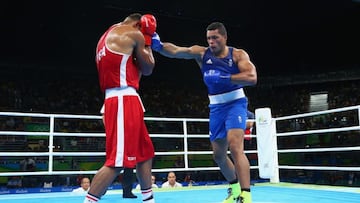Boxing at the Tokyo Olympics: weight categories, format, scoring system and rules
The boxing tournaments in Tokyo will take place from 24 July to 8 August 2021. Here’s all you need to know on its rules in the Olympic Games.

Boxing shares a very close relationship with the Olympic Games. In the ancient Games, Olympic boxing first made an appearance in 688 BC in Greece. With the modern-day Olympics starting in 1896, boxing found its place at the 1904 St Louis Games, USA.
Almost as old as human civilization itself, boxing has evolved into a sophisticated sport with complicated strategies over the years.
Olympic weight categories
At the Tokyo Olympics, there are a total of 13 weight categories, eight for men and five for women, in boxing.
Trying to get a greater number of participation from the female boxers, Tokyo 2020 organizing committee has reduced the men’s events from 10 to 8.
Men
Flyweight (48-52kg)
Featherweight (52-57kg)
Lightweight (57-63kg)
Welterweight (63-69kg)
Middleweight (69-75kg)
Light Heavyweight (75-81kg)
Heavyweight (81-91kg)
Super Heavyweight (+91kg)
Women
Flyweight (48-51kg)
Featherweight (54-57kg)
Lightweight (57-60kg)
Welterweight (64-69kg)
Middleweight (69-75kg)

Boxing tournament format
The Olympic boxing tournament follows a simple knockout format, with draws made at random for each weight class. Winners of each bout will qualify to the next round.
The winner of the final bout wins the gold medal while the loser gets the silver medal. Both boxers losing out in the semi-finals win bronze medals.
Boxing rules at the Olympics
Boxers wear protective gloves to avoid injuries. They can’t hit the opponent anywhere below the belt or on the back of the head, as it’s prohibited.
In women’s Olympic boxing, protective headgears are a must, while for men headgears were removed in the Olympics from 2016.
An Olympic boxing bout comprises three rounds of three minutes each. Each round is separated by a one-minute break.
A boxer can win via knockout/KO. When a boxer lands enough legal hits on their opponent to knock them down and the opponent is unable to stand up within a count of 10 by the referee, it constitutes a KO victory. In this case, the bout ends immediately.
Next stop, @OlympicCityUSA!
— USA Boxing (@USABoxing) June 12, 2021
🔜@Tokyo2020 https://t.co/JdCL0d3ytg
When there’s no knockout, the bout, which lasts for the entire three rounds, is decided through points. Five judges score the boxers based on the number of blows landed on the target areas, domination of the bout, technique and tactical superiority. Deductions can also be made based on infringement.
At the end of every round, each judge determines a winner and award the victor 10 points for the round. The loser of the round can be given between seven to nine points.
At the end of the bout, each judge determines the final winner. A boxer can win via unanimous decision if all five judges unanimously agree that the winner has taken two or more rounds. If they have a different view, the majority consensus is taken into account and the winner is determined through split decision.
The 10-point-must system was adopted in the Rio Olympics by the International Boxing Association (AIBA) and International Olympic Committee (IOC) making the scoring more similar to professional boxing.
Related stories
The winner of a boxing bout can also be determined through RSC (Referee Stop Contest) -when the referee or ringside doctors deem one of the boxers unfit to continue a bout-, walkovers, disqualifications (DSQ) or when a boxer retires voluntarily or his corner throws in the towel (ABD).
Disqualifications occur when a boxer accumulates three warnings for using means that breach the rules of fair play. Unsportsmanlike conduct can also lead to a direct disqualification.

